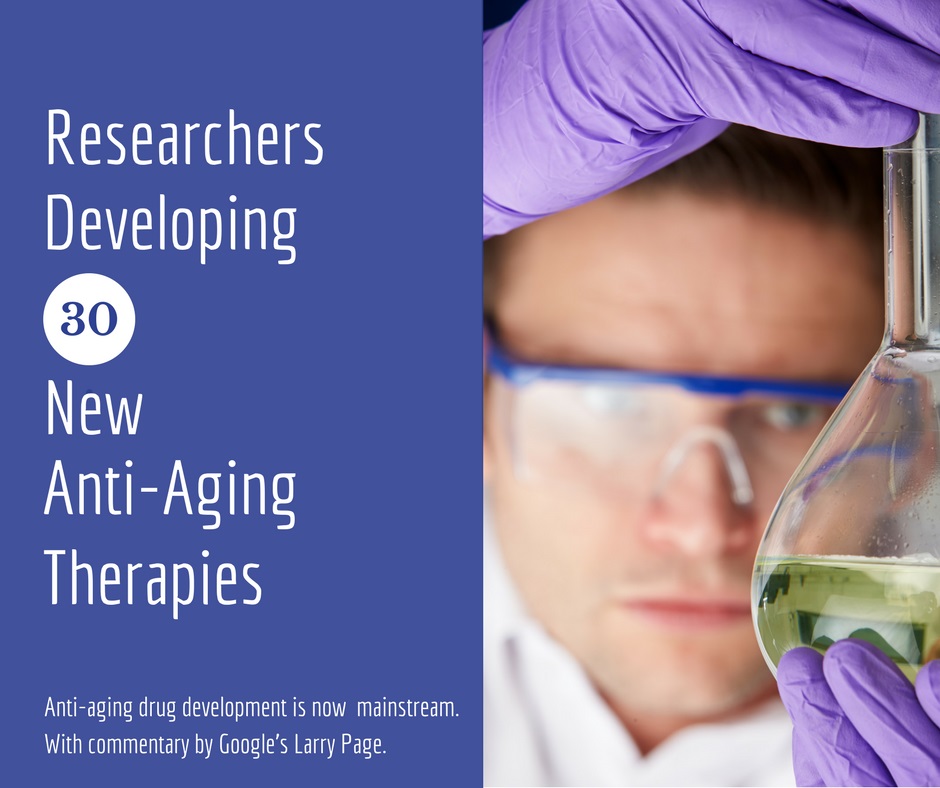Diagnosis, Advice, and Treatment: This article is intended for informational and educational purposes only and is not a substitute for professional medical advice. Anti-aging therapies are considered experimental and involve extra risks. The information provided in this article should not be used during any medical emergency or for the diagnosis or treatment of any medical condition. A licensed physician should be consulted for the diagnosis and treatment of any and all medical conditions. Dial 9-1-1 or the equivalent emergency hotline for all medical emergencies. As well, consult a licensed physician before your changing diet, supplement or exercise programs. Photos, External Links & Endorsements: This article is not intended to endorse companies, organizations or products. Links to external websites, depiction/mention of company names or brands, are intended only for illustration and do not constitute endorsements.
Researchers Developing 30 New Anti-Aging Therapies
Summary: Lifespan-extension science, also known as geroscience, has gone mainstream as businesses are investing billions, and researchers have already identified 30 anti-aging compounds. With commentary by Google’s Larry Page and the geroscientist Steven N. Austad. [This article first appeared on the LongevityFacts.com website and was updated on Feb 26, 2018. Author: Brady Hartman.]
Rather than fighting the chronic diseases of aging individually, scientists are attacking the root of the problem – the aging process itself. As the race to cure aging has gone mainstream, recent scientific discoveries have shown promise for extending life, but will take a decade to reach the market. The goal is to stay alive long enough in order avail of these breakthroughs.

30 Anti-Aging Therapies Found
Scientists have developed 30 treatments that slow down or reverse aging in laboratory animals. The American Federation for Aging Research (AFAR) reports that dozens of promising anti-aging therapies and drugs have already been identified and researchers will continue to create new ones. As AFAR states in its most recent annual report:
“More than 30 drugs shown to influence the aging processes in animal studies are moving toward clinical trials”
Focus On Anti-Aging Therapies
In the past, drug development has been focused on treatments to combat specific diseases of aging, such as type 2 diabetes, atherosclerosis, cancer, arthritis, hypertension, coronary heart disease, and Alzheimer’s disease. The last two decades have witnessed a shift in which scientists who specialize in the field of lifespan-extension, called geroscientists, are now developing anti-aging therapies. These treatments target the fundamental processes that underlie the chronic diseases of aging.
Landmark Anti-Aging Discovery
The explosion in age-related research is due to a landmark discovery in the 1990’s that aging is not necessarily inevitable. Instead, it is caused by accumulating damage and genetic changes, known as the Hallmarks of Aging. Scientists found that some anti-aging therapies cause animals to live twice as long.
As well, scientists have discovered several key molecular pathways that regulate aging. And since all biological pathways are governed by proteins, it that means that drugs can be developed that can target these pathways.
Steven N. Austad, Ph.D. is a distinguished professor and department chair in the Department of Biology at the University of Alabama at Birmingham. The future for lifespan-extending drugs looks bright as Dr. Austad, a leader in the anti-aging field says,
“The prospects of dramatically increasing human longevity are excellent.”
These innovations rest on a firm foundation of decades of research that has established a link between the biological processes of aging and chronic diseases. While compounds have been shown to slow down or reverse aging in animals, these groundbreaking therapies are not yet ready for human consumption. It typically takes about ten years or more for a new drug to progress through clinical trials before it is considered safe and effective for people.
Anti-Aging Therapies Have Gone Mainstream
Once considered the fantasy of kooks and science fiction writers, radical life extension has gone mainstream.
Respected scientists are involved in the field, and big business is investing money in developing anti-aging therapies. Corporations aren’t merely spending money in dribbles and drabs. Instead, they are putting in billions.
Google’s Calico Labs
The race to cure aging made headlines when tech giant Google announced the creation of Calico Labs, an acronym for California Life Company. With 1.5 billion dollars in funding, Calico Labs’ stated mission is to
“devise interventions that enable people to lead longer and healthier lives.”
Calico Labs is a startup devoted to developing anti-aging therapies. It’s been nearly four years since the company started in 2013 and TIME Magazine announced the start-up with great fanfare. In that year, TIME interviewed Google founder Larry Page, who said:
“..it takes 10 or 20 years to go from an idea to something being real. Health care is certainly one of those areas. We should shoot for the things that are really, really important, so 10 or 20 years from now we have those things done.” – Larry Page, Google Founder.
Promising Anti-Aging Therapies
Science has recently uncovered more esoteric anti-aging therapies, such as calorie restriction and intermittent fasting. As well, research has shown that existing drugs, such as metformin and rapamycin and can ward off the development of the chronic diseases of aging.
Anti-Aging Drug Candidate Metformin
Substantial evidence shows that metformin prevents cancer and extends the lives of type 2 diabetics. Famed longevity researcher Nir Barzilai, MD is currently running a $65 million clinical trial of the anti-aging drug metformin in 3000 healthy senior adults.
Leading Anti-Aging Drug Candidate Rapamycin
Rapamycin has extended the lifespan of every animal tested so far, from worms to mice. Human testing has already begun. Researchers in Texas are currently testing the anti-aging drug rapamycin in a clinical trial. While taking the drug daily has strong side-effects, research has shown that intermittent rapamycin preserves anti-aging benefits while minimizing side-effects.
Calorie Restriction
Anti-aging researchers laud calorie restriction (CR) as the only proven intervention to retard the aging process.
Calorie restriction is the practice of permanently slashing calorie intake by 20% – 40% in an effort improve health and prolong lifespan. While it sounds unpleasant, a growing body of research suggests that CR may ward off diabetes, cancer and heart disease and add years to a person’s life.
Prolonged calorie restriction is difficult to practice for most people. Furthermore, the diet lowers the metabolism, which reduces calorie expenditure. A person on a CR diet cuts calories, but the body reduces energy expenditure to balance it out. Researchers have discovered a compromise. In what is known as a Fasting Mimicking Diet, by restricting calories only five days a month, dieters gain all the health benefits of CR without a drop in metabolism. You can learn more about calorie restriction and the fasting mimicking diet in the linked article.
Some Already Using Anti-Aging Therapies
Anti-aging drugs have not yet been proven safe or effective for life-extension purposes. Clinical trials are the only way to find out if these drugs work as promised.
Some people aren’t waiting around for clinical trials to prove they are safe and effective for life extension. You can read about it in two linked articles. As the first linked article shows, one Chicago physician is already prescribing a cocktail of anti-aging drugs. In another linked article, you’ll learn how Google’s Futurist, Ray Kurzweil takes 100 pills daily in a bid to live longer.
Stay Alive Long Enough
The short-term goal is to live long enough to avail of the anti-aging therapies that are in the pipeline. Staying alive to stay alive. It’s not as hard as it sounds: the medical community has already discovered drugs and treatments, called interventions, that have been linked to living longer. Most people are already familiar with familiar life-prolonging strategies, such as quitting smoking, eating a healthy diet and losing weight by eating fruits and vegetables, keeping cholesterol low, regular physical activity and managing chronic conditions like prediabetes and type 2 diabetes.
Stay Tuned For More Anti-Aging Therapies
This is the first in a series of articles on the subject of life extension. Upcoming articles in this series will report on both the classic and esoteric anti-aging therapies.
Show Us Some Love
- One click helps us spread the word – Share this post on with your friends. It only takes one click on any of the social media links on this page.
- Follow us on social media – For more articles, follow us on Google+ | Facebook | Reddit
- Sign up for our email list – We use your email to notify you of new articles. We won’t send you spam, and we won’t share your email address. You can cancel at any time.
- Tell us what you think – Please scroll down to enter your comments.
References
American Federation for Aging Research (AFAR), THE ARCHITECTS OF AGING: 2016 ANNUAL REPORT, American Federation for Aging Research. June 22, 2017. Web. Link.
Carlos López-Otín, M. A. Blasco, L. Partridge, M. Serrano, and G. Kroemer.The Hallmarks of Aging. (2013). Cell, 153(6), 1194-1217. Link.

You need to fix the references and the pics .. nice article .. well written
You need to fix the pics all except the first one .. nice article .. well written ..
thanks for posting this